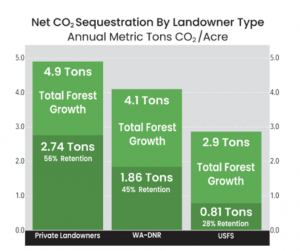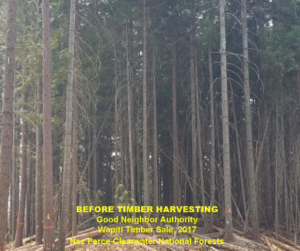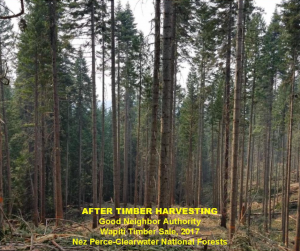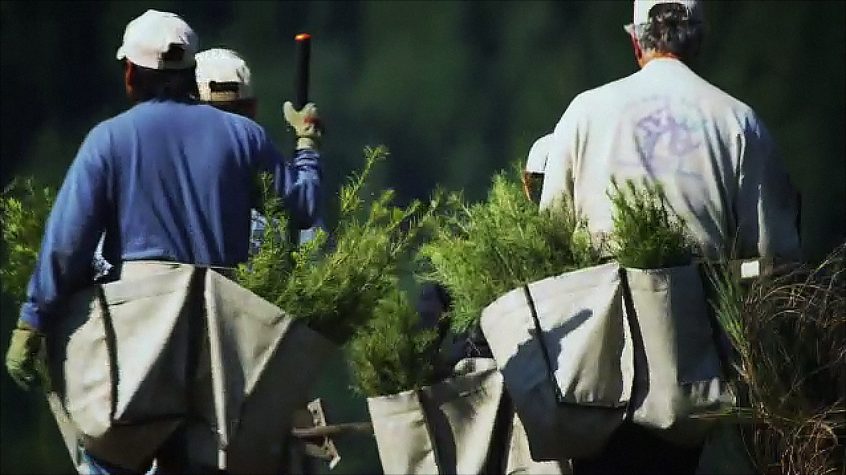The Whatcom County Forestry Advisory Committee invited researcher Dr. Edie Sonne Hall of Three Trees Consulting to speak at their April meeting and share her insights on how forest management mitigates climate change. The topic is timely as communities, governments and policymakers search for ways to reduce the amount of CO2 gas in our atmosphere to lessen the impacts of a warming planet.
There’s a growing body of research that demonstrates the critical role sustainable forestry practices and actively managed forests play in helping to mitigate climate change. After all, trees absorb CO2 gas from the atmosphere and through the power of photosynthesis, the carbon is converted to wood, branches and roots. In fact, 50% of the weight in wood is stored carbon. It is because of this process that people have looked to trees and consider forests the ultimate carbon capture technology.
But, as Sonne Hall underscored, while growing trees are excellent at sequestering carbon, keeping forests untouched and unmanaged would work against climate change mitigation efforts. That’s because trees are living organisms that eventually die and are susceptible to stressors like drought, intense heat, disease, infestation, predation and wildfire.
 Sharing data from University of Washington researchers, Sonne Hall showed the committee that each year, forests actively managed by private landowners sequester 4.9 tons of carbon dioxide per acre, nearly twice as much as unmanaged US Forest Service forests. Only living and growing trees sequester carbon. More than 70% of the annual forest growth/acre is dying each year in unmanaged USFS forests. Overcrowded, dead and dying trees increase the risk of wildfire that releases all the carbon emissions at once. A single fire season can wipe out years of efforts to cut emissions, like what happened in California last year where nearly twenty years of emissions reductions were erased by a single, devastating year of wildfires that released 127 million metric tons of carbon dioxide compared to 65 million metric tons of reductions achieved in the previous 18 years.
Sharing data from University of Washington researchers, Sonne Hall showed the committee that each year, forests actively managed by private landowners sequester 4.9 tons of carbon dioxide per acre, nearly twice as much as unmanaged US Forest Service forests. Only living and growing trees sequester carbon. More than 70% of the annual forest growth/acre is dying each year in unmanaged USFS forests. Overcrowded, dead and dying trees increase the risk of wildfire that releases all the carbon emissions at once. A single fire season can wipe out years of efforts to cut emissions, like what happened in California last year where nearly twenty years of emissions reductions were erased by a single, devastating year of wildfires that released 127 million metric tons of carbon dioxide compared to 65 million metric tons of reductions achieved in the previous 18 years.
Private landowners retain more than three times the annual growth or 2.74 tons in carbon storing wood and live trees, whereas slower growing and unhealthy USFS retain barely 1 ton of carbon dioxide per acre. Since USFS lands dominate our landscape, bringing all of our forests back to health is the primary way our forests can have a positive impact on carbon dioxide emission reductions.
 Sonne Hall also emphasized that proposals to remove state working forest lands are not a sustainable approach since managed forests unquestionably result in improved forest health and lower tree mortality rates. More than half of state Dept. of Natural Resource lands, or 1 million acres, already doesn’t allow harvesting. Across the state, riparian forest buffers, national parks and wilderness areas are protected because of their “high conservation value.” Providing local context, Sonne Hall noted that 75% of Whatcom County’s total forest land base is restricted from harvest because of North Cascades National Park, unmanaged USFS lands, state lands set-asides as well as county, private and tribal riparian buffers.
Sonne Hall also emphasized that proposals to remove state working forest lands are not a sustainable approach since managed forests unquestionably result in improved forest health and lower tree mortality rates. More than half of state Dept. of Natural Resource lands, or 1 million acres, already doesn’t allow harvesting. Across the state, riparian forest buffers, national parks and wilderness areas are protected because of their “high conservation value.” Providing local context, Sonne Hall noted that 75% of Whatcom County’s total forest land base is restricted from harvest because of North Cascades National Park, unmanaged USFS lands, state lands set-asides as well as county, private and tribal riparian buffers.

At the end of the day, addressing climate change requires a host of approaches, including the forest sector and a thriving wood products industry. Washington state and its robust forestry sector which supports more than 102,000 jobs statewide is poised to play a significant role in this effort because of its low manufacturing carbon footprint, stringent forest practices rules, and the high-quality wood it produces.
Wood is a renewable resource. And when sustainably produced, it helps address climate change two-fold by providing an environmentally friendly building material that when used, displaces emissions from non-renewable building materials, and promoting forest health through active management practices.
Sonne Hall concluded her presentation by urging decision makers to address forest threats and forest resiliency through management and supplying the market with sustainably produced wood products.
The Forestry Advisory Committee reviews and recommendations to the Whatcom County Council on issues related to the forestry sector. The Committee also provides a forum for all branches of the forestry community to share thoughts on the future of forestry in the county. You can watch Sonne Hall’s presentation and the entire Forest Advisory Committee meeting at this link.
